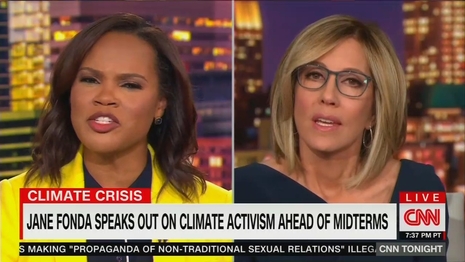 On Thursday’s CNN Tonight, host Laura Coates decided to defend climate change lunatics who have recently spent their time gluing themselves to walls in museums or throwing food at irreplaceable artwork in a desperate attempt to force sane people to think humans can control the weather. During her interview with Hanoi Jane Fonda, the disgraced actress told Coates that this tactic isn’t helpful to the left’s radical climate agenda.
On Thursday’s CNN Tonight, host Laura Coates decided to defend climate change lunatics who have recently spent their time gluing themselves to walls in museums or throwing food at irreplaceable artwork in a desperate attempt to force sane people to think humans can control the weather. During her interview with Hanoi Jane Fonda, the disgraced actress told Coates that this tactic isn’t helpful to the left’s radical climate agenda.
“What do you make of what we're seeing in some, you know, art museums, in some areas of the world where people are throwing food onto revered works of art as a way to draw attention?” Coates asked Fonda. “Do you think that this tactic is something that is getting the attention and moving the needle in a way that, say, your work has?”
Even Fonda who has a long history of embarrassing herself in public for her anti-American causes didn’t think this was a wise idea. “It certainly gets attention, but I think that it makes people angry,” Fonda said.
“I have avoided, for example, blocking freeways and things that will -- you know, the average person wants to get home for dinner or wants to get to where their kids are in school or whatever,” Fonda added.
She went on to say, “I'm not in favor of doing things that are gonna make the average working person angry because it affects them and their lives.”
Seemingly agreeing with her guest, Coates replied that “some argue that maybe it affects the way they view the overall movement. That could be counterproductive.” Although she added the qualifier that “you never know.”
After Fonda was gone, Coates turned to Alisyn Camerota to analyze the interview.
Coates revealed that she was thinking about Fonda’s “response about the tactics being used now because that's getting a lot of attention in terms of defacing artwork and what that means and that overall conversation.”
Still addressing Camerota, Coates asked, “what's more important to you, this art or the long-term, you know, sustainability of our planet?”
Apparently, Coates thinks this is a difficult question. The obvious answer is that priceless artwork is more important than the “sustainability of our planet” since Earth is not in danger in any conceivable way.
This insane climate alarmist segment on CNN was made possible thanks to Fidelity. Their information is linked so you can let them know about the propaganda they fund.
To read the transcript click “expand”:
CNN Tonight
10/27/2022
10:36:14 p.m. EasternLAURA COATES: I wonder the way that you have gone about it from fire drill Fridays and beyond, the way you've gone about to be consistent, what do you make of what we're seeing in some, you know, art museums, in some areas of the world where people are throwing food onto revered works of art as a way to draw attention? Do you think that this tactic is something that is getting the attention and moving the needle in a way that, say, your work has?
JANE FONDA: It certainly gets attention, but I think that it makes people angry. You know, I have been arrested a lot of times for engaging in civil disobedience, which is doing things that are against the law if a law is wrong. But I have avoided, for example, blocking freeways and things that will -- you know, the average person wants to get home for dinner or wants to get to where their kids are in school or whatever, so I'm not particularly -- I understand where the anger comes from. I'm not in favor of doing things that are gonna make the average working person angry because it affects them and their lives.
COATES: And, you know, some argue that maybe it affects the way they view the overall movement. That could be counterproductive.
FONDA: Possibly.
COATES: You never know. But all I know is the amount of work that’s being done and the work through your PAC as well, thank you for joining us this evening and making sure that the lines are drawn and the bridges are felt for the electorate about what is on the ballot even if some things feel like they're in invisible ink. Thank you, Jane.
FONDA: Thanks a lot. I appreciate being here. Thanks.
COATES: Thank you.
ALISYN CAMEROTA: Really interesting.
COATES: Wasn't it? Just thinking about actually her response about the tactics being used now because that's getting a lot of attention in terms of defacing artwork and what that means and that overall conversation. Well, what's more important to you, this art or the long-term, you know, sustainability of our planet? It's really fascinating.





